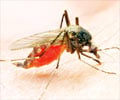The antimalarial primaquine is a cornerstone of global efforts to eliminate malaria, for some 70 years it has been the only drug registered that has been demonstrated to be able to cure relapsing malaria and block transmission of the disease.

TOP INSIGHT
The search for new antimalarials is vital in the drive towards global malaria elimination, especially given that PQ is potentially lethal to people with the genetic disorder glucose-6-phoshate dehydrogenase (G6PD) deficiency, which affects millions of people in malaria-endemic countries.
The team at LSTM, working with key collaborators including Professor Paul O'Neill (University of Liverpool), Professor David Baker (London School of Hygiene and Tropical Medicine) and Professor Sangeeta Bhatia (Massachusetts Institute of Technology, USA) were able to replicate the interaction between the drug and the host enzymes which catalyse the generation of cytotoxic amounts of hydrogen peroxide from metabolites of PQ. The experiments were able to demonstrate why the drug displays exquisite selectivity against specific parasite stages and also explains why only very small (nM) catalytic concentrations of metabolites are necessary to kill the parasites.
"This is why an understanding of how the drug works is central to replicating its most significant elements." Continued Professor Biagini: "This work has been possible with CDD given the multidisciplinary nature of the team. The current study makes a significant advancement in our understanding of PQ mechanism of action. This new knowledge is key to the development of newer and safer, broad-spectrum antimalarial drugs, work currently underway within our group."
Source-Eurekalert
 MEDINDIA
MEDINDIA



 Email
Email





